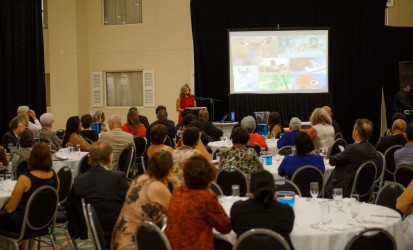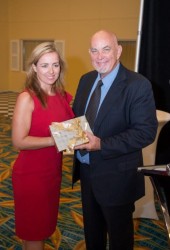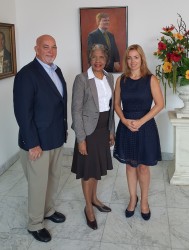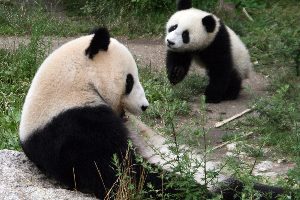Worldlog de noviembre 2015
Durante la semana de vacaciones de otoño, entre el 22 y el 27 de octubre, estuve en el Caribe invitada por la Fundación para la Protección de Animales de Curazao (Dierenbescherming Curaçao). En una cena benéfica organizada por ellos tuve la ocasión de dirigir unas palabras a los asistentes sobre la turbulenta relación entre el ser humano y los animales, oportunidad que aproveché para apuntar las importantes mejoras que debe acometer Curazao en materia de bienestar animal. Porque además de la enorme problemática de los animales vagabundos, en Curazao, por ejemplo, solo se encuentran huevos procedentes de baterías, y cuestiones como el consumo de carne, la caza, el sufrimiento de los perros de raza seleccionados en función de su aspecto físico o las pruebas de laboratorio con animales no son temas que estén en la agenda política. Muchos de los presentes se acercaron a mí después de la charla para intercambiar opiniones. Fue una noche muy inspiradora en la que establecí numerosos y cálidos contactos con entusiastas activistas de la protección animal.



Entrega / Con Gregory Berry, presidente de la Fundación para la Protección de Animales de Curazao / Visita de trabajo a la gobernadora, señora George-Wout
También me reuní con diversas organizaciones de protección de los animales y la naturaleza, incluyendo Friends of the Earth, Curaçao Animal Rights Foundation y DCNA (Dutch Caribean Nature Alliance). Uno de los temas tratados con Friends of the Earth fue la refinería de petróleo presente en la isla, denominada precisamente ISLA (anteriormente Shell), y su impacto en el medioambiente y la salud pública. Shell todavía no ha asumido ninguna responsabilidad sobre los daños causados por la refinería a lo largo de los años.
Por lo demás, también tuve tiempo de hacer una visita al centro de acogida de animales de Willemstad, un centro que realiza una labor imprescindible pero cuya existencia está en peligro debido a problemas de financiación. Su desaparición sería un drama para los muchos perros y gatos que tienen asilo en el centro. Durante mi reunión con la gobernadora, la señora George-Wout, saqué a colación esta cuestión. La gobernadora recibió positivamente la idea de crear una clínica de animales móvil para esterilizar y castrar a los perros en los barrios.
También hablé con la gente de Wild Donkeys y del Donkey Sanctuary en Bonaire, para informarme in situ sobre la situación de los burros que viven en esta isla desde que llegaron con las expediciones españolas en el siglo XVI. Ya he planteado algunas preguntas parlamentarias sobre la situación de los burros en Bonaire. Las opiniones de las distintas organizaciones de protección animal sobre la forma de resolver los problemas existentes son muy diversas, por lo que me he informado bien al respecto. Hay dos cuestiones en las que todas parecen estar de acuerdo: los burros tienen que recuperar el acceso a antiguos puntos de agua ahora cerrados y necesitan mayor protección contra el tráfico de la isla.
Pandas chinos
 Después de la semana de vacaciones de otoño realicé inmediatamente preguntas parlamentarias al presidente y al ministro de Asuntos Exteriores sobre los osos panda que Holanda ha recibido como supuesto regalo de China, pero que en realidad ha tomado en alquiler, con motivo de una misión comercial al gigante asiático. El intercambio de estos animales tan vulnerables y escasos para exhibirlos en un zoológico holandés no es de recibo en los tiempos que corren y, desde luego, no debería formar parte en ningún caso de una misión comercial a un país que viola a gran escala los derechos fundamentales de las personas y los animales. China presta pandas a países con los que quiere estrechar lazos. Nuestro Gobierno haría bien en dar prioridad a los derechos de las personas y los animales por encima del comercio. Además, considero que un presidente y un ministro de Asuntos Exteriores deben dedicarse a cuestiones más importantes que el préstamo de osos pandas para el beneficio comercial de un zoológico concreto.
Después de la semana de vacaciones de otoño realicé inmediatamente preguntas parlamentarias al presidente y al ministro de Asuntos Exteriores sobre los osos panda que Holanda ha recibido como supuesto regalo de China, pero que en realidad ha tomado en alquiler, con motivo de una misión comercial al gigante asiático. El intercambio de estos animales tan vulnerables y escasos para exhibirlos en un zoológico holandés no es de recibo en los tiempos que corren y, desde luego, no debería formar parte en ningún caso de una misión comercial a un país que viola a gran escala los derechos fundamentales de las personas y los animales. China presta pandas a países con los que quiere estrechar lazos. Nuestro Gobierno haría bien en dar prioridad a los derechos de las personas y los animales por encima del comercio. Además, considero que un presidente y un ministro de Asuntos Exteriores deben dedicarse a cuestiones más importantes que el préstamo de osos pandas para el beneficio comercial de un zoológico concreto.
La semana pasada, la Organización Mundial de la Salud incluyó la carne procesada (como el beicon, el jamón, las salchichas y las hamburguesas) en la lista de productos cancerígenos. Una vez más se demuestra que consumir menos carne no solo es bueno para los animales y el medioambiente, sino que también es lo más sensato para tu propia salud.
Y para terminar, me gustaría compartir con vosotros esta simpática noticia sobre un club de fútbol británico que ofrece a sus aficionados refrigerios exclusivamente veganos.
¡Hasta la próxima!
Un saludo cordial,
Marianne
At the invitation of the Curacao Society for the Protection of Animals, I have travelled to the Caribbean during the autumn recess from 22 to 27 October. They had organised a charity gala dinner where I discussed the troubled relationship between man and animal.
I took this opportunity to point out the considerable improvements yet to be made by the Curacao government in order to become more animal-friendly. After all, in addition to its massive stray animal issue, Curacao only sells battery cage-eggs, and items such as the consumption of meat, hunting, animal testing and the suffering of many purebred dogs that are bred solely for their external traits are not high on the political agenda. Many of the attending guests approached me after my speech to exchange thoughts. It has been an inspiring evening on which I have met many friendly and enthusiastic animal protectionists.



Presentation / With Gregory Berry, chairman of the Curacao Animal Rights Foundation / Meeting with the Governor, Mrs. George-Wout
I have had many discussions with various animal welfare and environmental organisations, including Friends of the Earth, Curacao Animal Rights Foundation and DCNA (Dutch Caribbean Nature Alliance). An important subject of debate with Friends of the Earth was the Isla oil refinery (formerly known as Shell) located on the island, and its impact on the environment and public health. Shell has still not taken any responsibility with regard to the damage caused by the refinery for years on end.
Furthermore, I have visited the animal shelter in Willemstad. The financing as well as the continued existence of this much-needed animal shelter are at risk, which could prove a disaster for the many cats and dogs that receive shelter here. I have discussed this problem with the shelter’s Governor Mrs George-Wout. She was very positive about the idea of setting up a mobile animal clinic with the purpose of neutering dogs in the different districts.
On Bonaire, I have spoken to people from Wild Donkeys and Donkey Sanctuary in order to deepen my knowledge on-site of the situation of the donkeys living there ever since the Spanish brought them to the island in the 16th century. On several occasions, I have put forward Parliamentary questions about the situation of these donkeys. Different animal protectionists hold rather different views on the best possible approach and I have made thorough inquires about it with several organisations. They do seem to be in agreement about two things: the donkeys should regain access to old, currently closed springs, and the animals should be better protected from traffic on the island.
Chinese panda’s
 As soon as the autumn recess was over, I put forward my Parliamentary questions regarding the Chinese pandas to our Prime Minister and our Minister for Foreign Affairs. It so happens that the Netherlands was given two pandas by the Chinese government as a “present”, or rather they were lent to us as a result of a trade mission between China and the Netherlands. Exchanging fragile and rare animals and then displaying them in a Dutch zoo is truly outdated and should certainly not be part of a trade mission with a country where human and animal rights are violated on a large scale. China “lends” pandas to countries with which they want to form a closer relationship. It would be to the credit of our government if it would choose human rights and animal welfare over trade. Furthermore, I believe that a prime minister and a minister for Foreign Affairs should concern themselves with matters that are more important than obtaining pandas for a zoo’s commercial gain.
As soon as the autumn recess was over, I put forward my Parliamentary questions regarding the Chinese pandas to our Prime Minister and our Minister for Foreign Affairs. It so happens that the Netherlands was given two pandas by the Chinese government as a “present”, or rather they were lent to us as a result of a trade mission between China and the Netherlands. Exchanging fragile and rare animals and then displaying them in a Dutch zoo is truly outdated and should certainly not be part of a trade mission with a country where human and animal rights are violated on a large scale. China “lends” pandas to countries with which they want to form a closer relationship. It would be to the credit of our government if it would choose human rights and animal welfare over trade. Furthermore, I believe that a prime minister and a minister for Foreign Affairs should concern themselves with matters that are more important than obtaining pandas for a zoo’s commercial gain.
Last week, the World Health Organisation has added processed meats such as bacon, ham, hot dogs and hamburgers to the list of carcinogens . Once again, this demonstrates that consuming less meat not only benefits animal and environment, but our own health as well.
To conclude, I would like to share with you this fun news item about a British football club that serves its fans strictly vegan snacks.
Until next time!
Marianne